By Timothy Cahill ‘16 M.A.R.
Some 175 scholars, clergy, theologians, and students bowed their heads as the bell tower at Yale Divinity School’s Marquand Chapel rang 39 times in remembrance of Martin Luther King. It was April 4, the 50th anniversary of Dr. King’s assassination, and at 7 p.m. a unison of church bells across the country were tolling at the same moment in mourning and memory. For those who had gathered in the Old Refectory at YDS, the moment marked more than the life and tragic death of an American prophet. They were convened at the school to open “Inspire: The Church in the 21st Century,” a three-day conference on Christianity in its third millennium. The bells for Dr. King only heightened the urgency of the gathering.
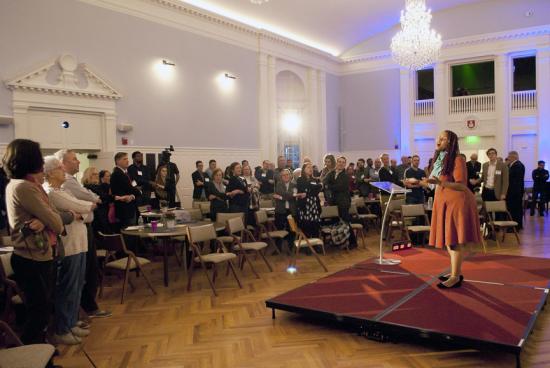
King’s ministry was one of the last flowerings of progressive Christianity in the United States. Much of his reforming moral force and social influence has succumbed to the evangelical movements that have shaped the faith’s public face since the 1970s. In the half-century since King’s death, theologically liberal Christianity has been pushed farther to the fringes of public discourse in this country and Europe. Church membership is down. Enrollment in American seminaries has declined. Christians struggle with the issues that define our times—economic injustice, bigotry, intolerance, climate change—and many conservatives address these challenges with rhetoric and dogma that alienates secular society from the church all the more.
***
The bell-ringers of YDS: See photos.
***
“What does it mean to embrace a faith that has been used—and is being used—to do so much damage?” asked Willie Jennings, YDS Associate Professor of Systematic Theology and Africana Studies, on the conference’s first day. “There are people who hate Christianity, and we have to reckon with that hatred.”
New narratives
Certainly none of the participants at “Inspire” was complacent about the challenges that face the 21st-century church. True to its name, the conference sought to breathe new life into progressive Christian practice. The program avoided the intellectual navel-gazing that can attend such conferences by placing theologians beside ministers, activists beside professors. The collegial atmosphere was energized by collisions of academic abstractions and real-world solutions.
This was precisely the dialogue that Peter McDonald, of the McDonald Agape Foundation, hoped to achieve in funding the conference. “We want,” he said, “to start narratives that address the church from the academy and the academy from the church.”
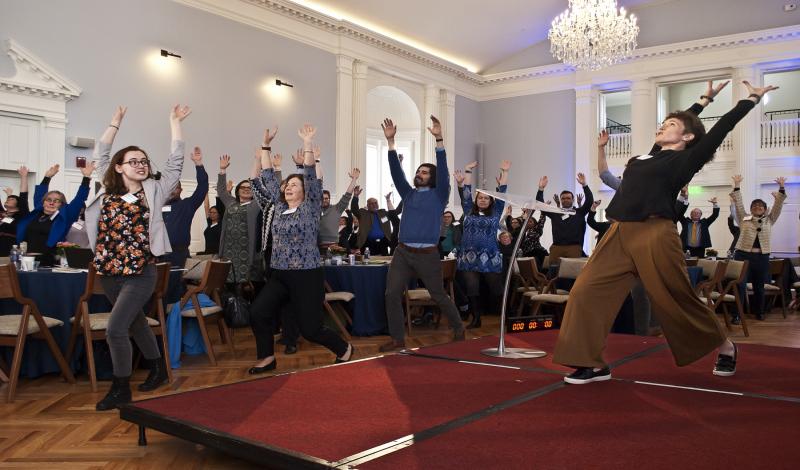 The conference was divided into seven sessions examining issues impacting the church in the 21st century, ranging from “The Future of Theological Conversation” and “Teaching About God for Tomorrow’s World” to “Christianity Across the World” and “Prophetic Witness and Social Transformation.” Each session featured three speakers, each speaker presenting a brief “TED”-style talk. After the presentations, audience members engaged in a question period, then broke into smaller group conversations. The sessions were punctuated by artistic interludes presented by current YDS students, “theology-in-action” that included sacred and folk songs, classical cello, poetry, spoken word, even a session of yogic stretches.
The conference was divided into seven sessions examining issues impacting the church in the 21st century, ranging from “The Future of Theological Conversation” and “Teaching About God for Tomorrow’s World” to “Christianity Across the World” and “Prophetic Witness and Social Transformation.” Each session featured three speakers, each speaker presenting a brief “TED”-style talk. After the presentations, audience members engaged in a question period, then broke into smaller group conversations. The sessions were punctuated by artistic interludes presented by current YDS students, “theology-in-action” that included sacred and folk songs, classical cello, poetry, spoken word, even a session of yogic stretches.
“Inspire” was organized in collaboration with The Nantucket Project, an annual gathering of leading thinkers known for its innovative formatting. The conference was, in effect, an extended plenary session, with all events held in the light-filled, newly renovated refectory in which YDS students once took their meals. The presenters and participants of this “three-day community” were united as much in their diversity as a common faith.
‘Fierce urgency of now’
If a single message emerged, it was that the church will regain its relevance only as it embodies and proclaims Christian principles of social equality, economic justice, and earth stewardship. “We are confronted with the ‘fierce urgency of now,’” Professor Jennings said, taking the phrase from a 1967 speech by Dr. King. “I feel that urgency,” he announced.
He seemed to be speaking for everyone in the room.
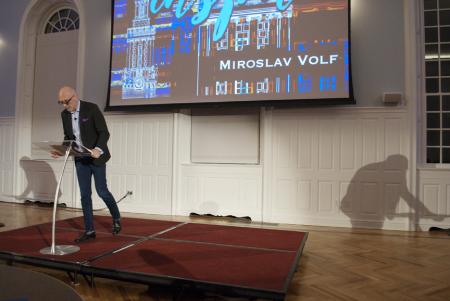 Miroslav Volf, Founding Director of the Yale Center for Faith and Culture and professor of Systematic Theology, began by placing the church in the context of the broader society. Volf described a “malaise” of postmodern culture arising from a desire to live “on bread alone,” with no spiritual foundation. “When we live by bread alone, there is never enough bread,” he said. “When we live by bread alone, someone always goes hungry.”
Miroslav Volf, Founding Director of the Yale Center for Faith and Culture and professor of Systematic Theology, began by placing the church in the context of the broader society. Volf described a “malaise” of postmodern culture arising from a desire to live “on bread alone,” with no spiritual foundation. “When we live by bread alone, there is never enough bread,” he said. “When we live by bread alone, someone always goes hungry.”
“Why doesn’t bread alone open us to joy?” Volf asked. “We cannot experience joy because of the loss of gratitude in the world.”
“We can be in paradise and still be malcontented, because there is always a forbidden tree,” he concluded. “When we see the world as a gift, though, we rejoice.”
The next day, Union Theological Seminary President Serene Jones ’85 M.Div. reflected on the crisis in the church. “When I was in divinity school [in the 1980s], we had no idea that for 30 years in a row church membership would decline,” Jones said. In the U.S. and Europe, the decline centers around the steady loss of white congregants, both mainline Protestants and evangelicals. Dori Baker, Senior Fellow for Research and Learning at The Forum for Theological Exploration in Decatur, Georgia, expressed the trend starkly. “The white church is dying,” she declared.
‘When change can happen’
Later in the conference, Amy Butler, Senior Minister at The Riverside Church in New York, reflected on the crisis in mainline American churches like her own.
“We’re in decline, and that is such an exciting place to be,” she said. “When you’re in desperation, that’s when change can happen.” The decline has created its own upward paths, she said, some of which carry their own irony. “Women are being asked to take over failing churches that men don’t want to touch,” Butler said, to the murmuring assent of the room’s female attendees. Her advice to divinity students facing a future of church management and fundraising: “Learn theology, but learn how to read a balance sheet, too!”
Yet as white Americans increasingly abandon the church, other races and nationalities continue to seek meaning there. Looking out at a conference of mostly white faces the evening before, Willie Jennings had predicted that in 20 years, “most of the people here will be people of color.” Instead of mourning the loss of its Western roots, the church should “embrace the people of color coming through the doors,” counseled Frank Yamada, Executive Director of the Association of Theological Schools in Pittsburgh.
As the membership of the church becomes more diverse, its vitality is increasingly centered in the southern hemisphere, the so-called “global South” of Africa, South American, and Asia. “The West has been displaced as the geographic center of Christianity,” reported Thomas Hastings, Executive Director of the New Haven-based Overseas Ministries Study Center. “In 1970, seven of 10 Christians lived in the West. By 2010, only three in 10 lived in the West. And by 2020, only two of the 10 most populated Christian countries will be in the West—the United States and Russia.”
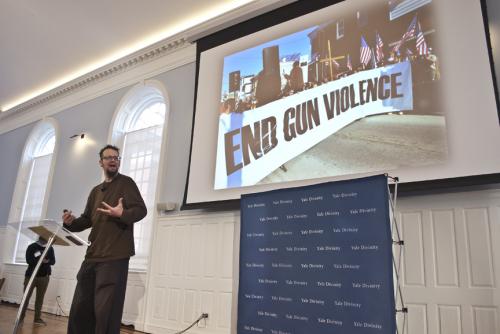 As the conference progressed, this trend felt less like a crisis than a renewal. The seeming “catastrophe” of demographic upheaval creates opportunity, declared Union’s Serene Jones. She reminded the conference, that “great thought, great creativity, cutting-edge work does not come in times of stasis.” Javier Viera ’10 S.T.M., Dean of Drew University Theological School, called “this moment” in Christianity one of “great experimentation.” It’s “increasing our reach,” he said.
As the conference progressed, this trend felt less like a crisis than a renewal. The seeming “catastrophe” of demographic upheaval creates opportunity, declared Union’s Serene Jones. She reminded the conference, that “great thought, great creativity, cutting-edge work does not come in times of stasis.” Javier Viera ’10 S.T.M., Dean of Drew University Theological School, called “this moment” in Christianity one of “great experimentation.” It’s “increasing our reach,” he said.
Several speakers offered expansive views of change across the globe. Shane Claiborne described the Simple Way, the Philadelphia community he helped found as part born-again monastery, part Catholic Worker-style commune. In his East Tennessee accent, he described the way his Christian community uses evangelism and activism to transform poverty into opportunity and beat swords into plowshares—something Claiborne and co-conspirators have done quite literally. “Our great challenge … is not theory, but imagination, and maybe courage,” Claiborne said. “We need to get public. We need to get in the streets.”
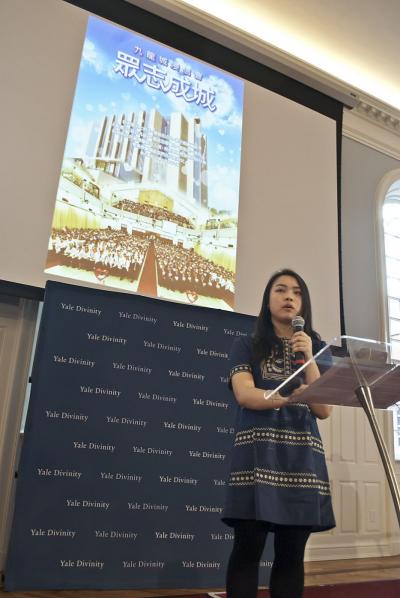
New sources of insight, answers
Sarah Pang Sze Yee, a YDS exchange student from Hong Kong, spoke of her activist experience in the “Umbrella Movement,” a “church-led Occupy movement in Hong Kong for social justice.” Activism, she said, helped open a new path for the church amid her country’s immense poverty and income inequality.
Emmanuel Lartey, professor of pastoral theology at Emory University’s Candler School of Theology, described the role of “mysticism and pluralism” in the African church. “There are long-standing mystical connections within African religious tradition,” he said, where “syncretism is not an evil thing. In Africa, it is the very center of the spiritual quest.”
But, Lartey cautioned, “do not look for an answer to the issues and problems faced here by reference to what others in their traditions do. Do not look for an African solution to an American problem.”
When it comes to climate change, however, an African-derived syncretism may be precisely what is needed, suggested Melanie L. Harris at the start of the third day. Harris is Founding Director of African-American and Africana Studies at Texas Christian University in Fort Worth and the author of Ecowomanism. The book describes an eco-social movement with roots in African cosmology, stressing an interdependence of native gods and Christian saints. Ecowomanism, Harris explained, rejects Western Platonism “that separates the earth from the divine.”
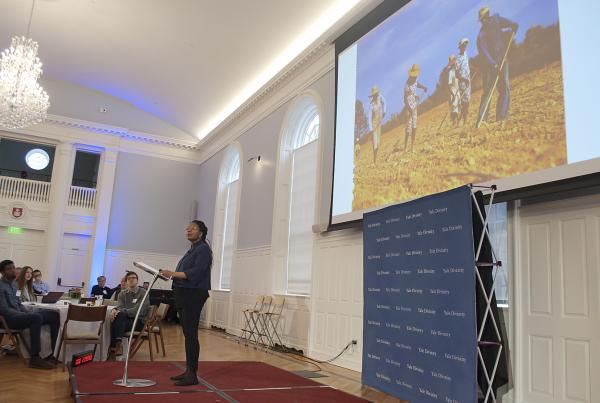 Harris was the first speaker of the conference’s penultimate session, titled “The Future of the Earth: Eco-Theology and the Work of the Church.” She set a tone of “fierce urgency” that defined the morning’s discussion.
Harris was the first speaker of the conference’s penultimate session, titled “The Future of the Earth: Eco-Theology and the Work of the Church.” She set a tone of “fierce urgency” that defined the morning’s discussion.
“The lens of African cosmology sees all things as sacred,” Harris said. Nature, humanity, divinity, and the spirit realm are intermingled. “The most important virtue of womanist theology is justice,” Harris continued, including “earth justice.”
“Any degradation of the body of the earth is sin,” she said. “White supremacism is not healthy for the earth.”
Willis Jenkins, Professor of Religious Studies at the University of Virginia and co-director of the Institute for Practical Ethics there, echoed this ethos of the earth as a living body. He began by praising Pope Francis’ encyclical Laudato si’, which quotes Saint Francis’ praise of creation as “our sister Mother Earth” and laments the world’s “slavery to the empire of fossil fuels.” Jenkins contrasted this stance to that of American evangelicals who deny climate change science. They have so fully aligned themselves with the “petro-based economy,” Jenkins said, “they cannot imagine their faith without it.”
Jenkins reminded the room that through much of Christian history, especially during the Industrial Revolution, “it was almost unchristian to … listen to the earth.” Echoing Melanie Harris, he spoke of a white Christian privilege that defines itself through “possession of, not possession by, the natural world.” Jenkins quoted extensively from the Pope’s encyclical, “for which [Francis] was called a pagan,” and joined Harris in seeking some remedy in a syncretic consciousness. “Recovering animist belief … is a way to recover the Christian person” and “the theology of creation,” he insisted.
‘The Kingdom is now’
Rev. Stephen Blackmer’s ministry also embraces a strain of “animist” sympathy. Blackmer ’12 M.A.R., ’83 M.F. founded the Church of the Woods in Canterbury, N.H., a community that weaves earth-consciousness into its liturgy.
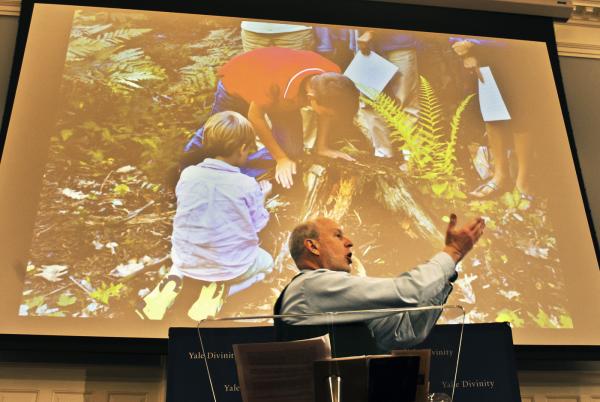 “Members of my congregation will appear on the screen,” Blackmer remarked as his slideshow began. Along with the individuals and families he leads in worship, these “members” also included a monarch butterfly, a toadstool, a white pine, and a porcupine, among other creatures. The Church of the Woods features a “three-part service with the earth at the center,” beginning with a scripture reading and “two-minute sermon” followed by 20 minutes during which parishioners walk in the woods. “That’s the central part of the preaching,” Blackmer explained.
“Members of my congregation will appear on the screen,” Blackmer remarked as his slideshow began. Along with the individuals and families he leads in worship, these “members” also included a monarch butterfly, a toadstool, a white pine, and a porcupine, among other creatures. The Church of the Woods features a “three-part service with the earth at the center,” beginning with a scripture reading and “two-minute sermon” followed by 20 minutes during which parishioners walk in the woods. “That’s the central part of the preaching,” Blackmer explained.
For Blackmer, the earth is the temple of creation. “What does it mean to preach the gospel when everywhere the temple is being torn down?” he cried. “The temple is being ripped to pieces and we don’t even see it!”
“There is a force of life and love more powerful than death,” he went on, falling into a homiletic cadence. “The earth will end someday. The sun will burn out. So what’s the point? The point is now. The Kingdom is now.”
Blackmer’s words were an apt summation of three days that were spirit-filled and down-to-earth, forward-looking but rooted in today. The conference adjourned with great hope for what lies ahead for Christianity and the church, even if the future may not look anything like the past, or present.
Timothy Cahill ‘16 M.A.R. writes on religion and the arts.